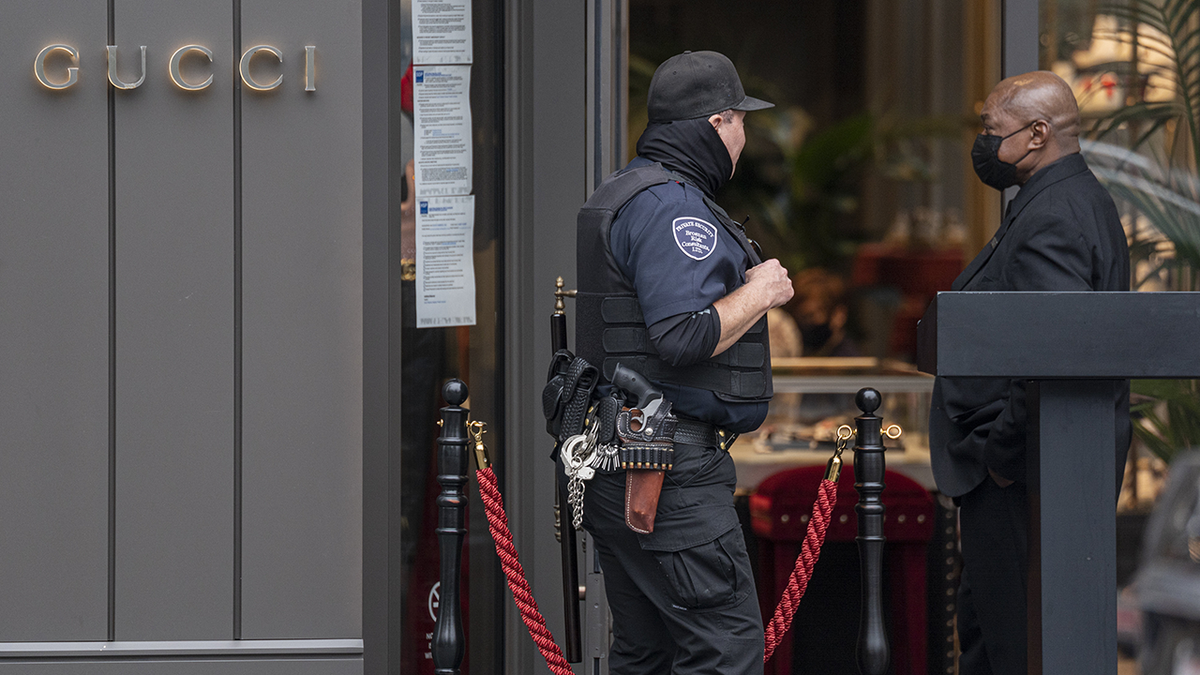Son of man killed by shoplifter says criminals need to face consequences for retail theft crimes
The son of a 82-year-old Home Depot worker killed by a shoplifter told ABC's 'Nightline' that criminals need to face consequences for their crimes.
Surging retail theft is having disastrous effects on businesses both large and small across the country. A recent survey of retail and grocery workers found that half of them witnessed a theft or attempted theft between October 2022 and April 2023.
Earlier this year, 20 different Dollar stores in the Detroit area were robbed within 22 days. To make matters worse, organized retail crime, in which groups of people work together to steal from retail businesses, is now presenting a growing threat.
This type of retail theft increased by 26.5% in 2021, according to the National Retail Federation, and seems to show no signs of slowing down.

A security guard outside a Gucci store in San Francisco, as retail theft increases across the United States. (Getty Images)
The Biden administration has done nothing to address this growing crisis. As a result, some retail employees have started taking matters into their own hands.
Recently, two workers at a 7/11 in California physically beat a would-be thief who attempted to leave the store with a 20-gallon trash can full of stolen cigarettes. The ongoing investigation has revealed that the suspect had stolen from the same 7/11 store at least twice before.
This increase in retail theft – and the way business owners and employees have been forced to respond – have a cascading and negative economic impact, especially on small businesses. They run their operations on very tight margins and are often dependent on selling their inventory on a week-to-week basis to pay rent and other expenses. Many small businesses could very easily go bankrupt from just a few robberies.
If the government refuses to tackle these problems, some small businesses feel forced to respond by locking up even inexpensive, basic household goods, or taking other steps to protect their livelihoods. Loyal customers then become frustrated, which hurts communities and creates a vicious cycle.
Federal, state and local governments are also highly dependent on small businesses to generate tax revenue. Corporate, property and sales taxes fund a variety of essential services, including schools and law enforcement. If small businesses have fewer or no customers, that means lower or no tax revenue for many government services.
In addition to the direct economic impacts, increasing crime harms small businesses in other, more intangible ways. It erodes the confidence of aspiring entrepreneurs and small business owners, which deters them from starting new ventures or expanding existing ones, stifles economic growth, and limits job opportunities. Nearly half of all private sector employees work at a small business, making them an important source of job creation.
Increased criminal activity can also discourage consumers from walking in downtown areas or staying out late. This has particularly negative effects on small businesses, many of which rely on foot traffic to survive. With the summer tourism season in full force, increased crime can deter tourists – typically a reliable source of revenue for small businesses – from taking a stroll downtown.
Finally, small businesses play a critical role in growing and maintaining their communities. Small businesses are often deeply integrated into their neighborhoods, promoting local events, raising money for local charities and serving as informal community leaders. Closing their businesses or simply reducing their hours or hiring fewer employees can cause a slow but steady decline in community morale.
BUSINESSES TAKE DRASTIC ACTION TO PROTECT AGAINST RAMPANT SHOPLIFTING, ORGANIZED CRIME THEFTS
People who do not have a safe environment in which they can do business often move away to other areas where their prospects seem brighter. Unfortunately, countless communities across America have experienced the devastating aftermath – when crime forces businesses to close – and the drug use, declining trust between neighbors, and shattered dreams for millions of hardworking Americans that often follows.
Policymakers at all levels of government must take this crime wave seriously if they want their communities to not only survive, but also thrive. Calls from the radical Left to "defund the police" do the opposite, and the leaders who make such recommendations put their constituents at risk and lead their cities to the brink of disaster.
By the end of 2021, at least 13 left-wing-controlled cities had taken steps to defund their police departments, and all 13 experienced significant increases in violent crime. Nevertheless, cities such as New York and San Francisco have doubled down, making the punishment for many crimes a simple citation or misdemeanor with no bail.
CLICK HERE FOR MORE FOX NEWS OPINION
This sends a chilling message to small businesses that they are not protected by local law enforcement and robberies will not be prosecuted.
To protect our small businesses and prevent our cities from entering a state of decline, our government must support our men in blue and enforce our laws. Small businesses represent the best of American communities, entrepreneurship and hard work. We all must do everything in our power to preserve this symbol of the American dream.














































